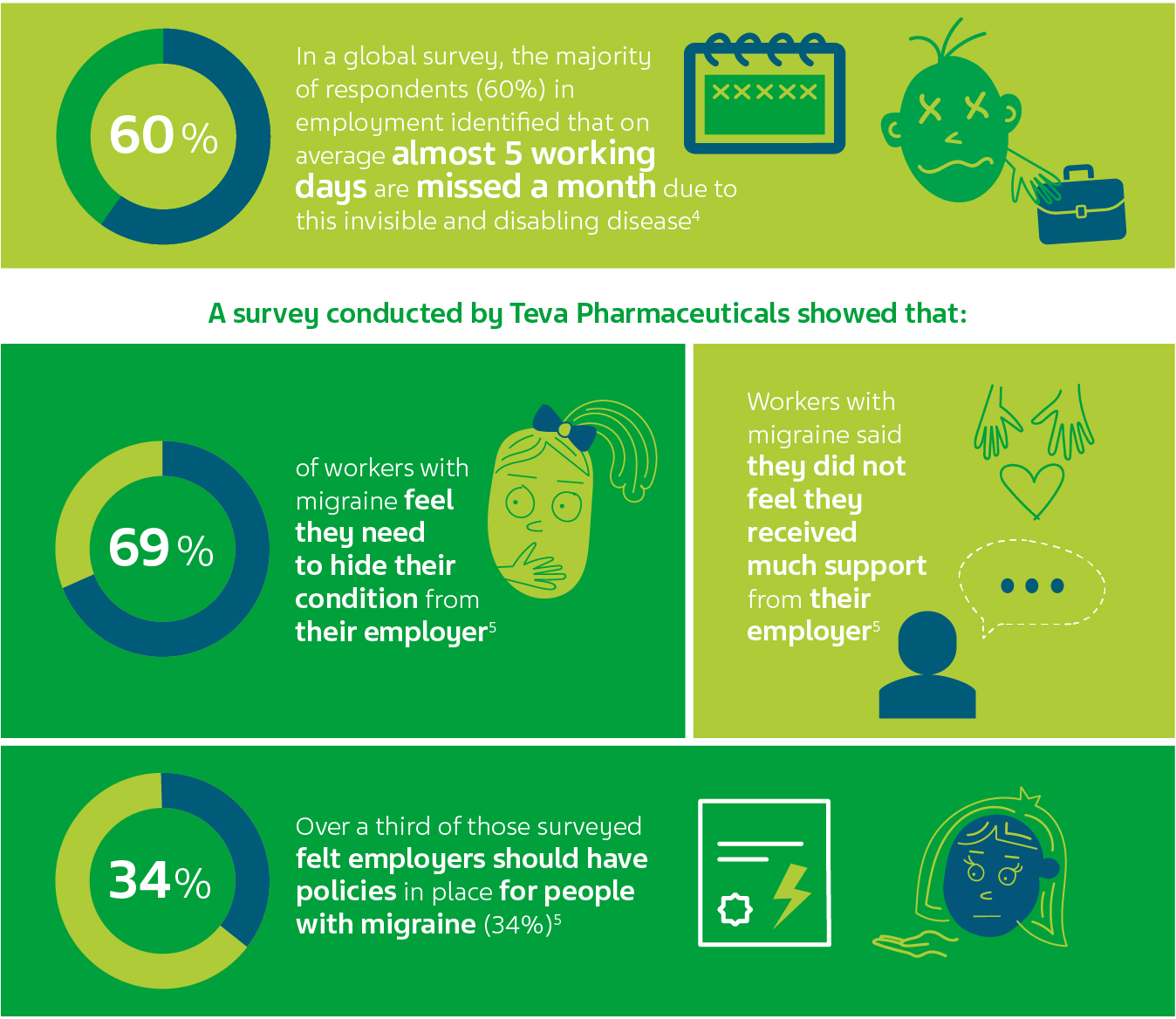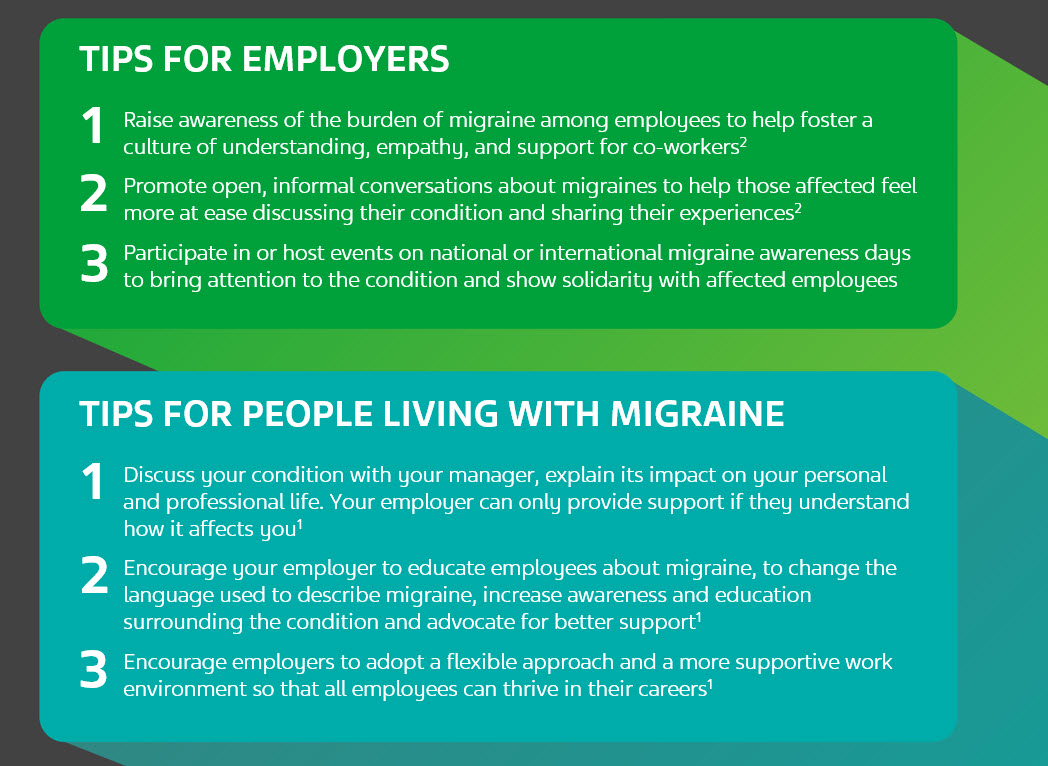Migraine at Work: How it Impacts Us All

With migraine affecting so many of us around the world, a Migraine Friendly Workplace Stamp in Europe developed by the European Headache & Migraine Alliance recognizes organizations that support their employees who suffer from migraine. We talk to team members at Teva about the experience of managing migraine at work and share their advice and coping strategies.

“Migraine pain is overwhelming and that is what people have to realize. Thankfully I have understanding colleagues and a supportive boss who back me up.”
Maria Stahlberg, Quality Manager, Teva Sweden
Maybe you’re a migraine patient or maybe you have a colleague or contact who suffers from this severe and debilitating health condition. Its reach is global and estimated to affect more than 10% of people worldwide. Approximately 39 million people in the US and 41 million in Europe have migraine.
With stats like these, it’s no wonder so many of us have been exposed to its effects – directly or indirectly.
Once dismissed as “just a bad headache”, migraine is now scientifically recognized as a disabling neurologic disorder characterized by moderate to severe head pain that can be exacerbated by movement and frequently accompanied by nausea, vomiting, and disruption of daily activities.

“My migraines often last a few days. In most cases, the attack begins early in the morning, around 4am with severe and unbearable pain in the temples, often followed by photosensitivity and even vomiting.”
Hana Chalupníková, Commercial Support Specialist, Teva Prague
Migraine Friendly Workplace Stamp aims to support migraine patients
A Migraine Friendly Workplace Stamp in Europe developed by the European Migraine & Headache Alliance (EMHA), recognizes organizations that support their employees who suffer from migraine. It rewards companies who are committed to providing a “friendly” migraine work environment for their employees, whether they suffer from migraine or work with colleagues who are afflicted by this condition. Find out more here.
What does this mean in practical terms?
The Migraine Friendly Workplace Stamp program is designed to mitigate the impact of migraine in the workplace by recognizing companies who create a supportive environment for their employees. This includes education for the work force and might include providing dark rooms where people can rest during a migraine attack or making water fountains widely available to help staff stay hydrated, which can help to reduce the frequency of migraine attacks.
Why is this important?
Teva recognizes that how we feel makes a difference to how we work. This type of workplace support is crucial because there is strong evidence that migraine patients often suffer in silence. In a Beyond Migraine survey carried out in 2020 by Teva of 12,545 adults with migraine in 16 countries worldwide, 63% of people have hidden their migraine from their employer, and only 1 in 8 people belonged to a patient support group.
Teva has helped to pioneer and has financially supported the development of the Migraine Friendly Workplace Stamp initiative in 2021 with the EMHA, working with an expert panel of migraine experts around Europe, including neurologists and physicians in occupational medicine to develop the program. And in June 2022, Teva Pharmaceuticals Europe B.V. was accredited the Migraine Friendly Workplace Stamp.
Migraine at work: the reality

- My Migraine Voice survey: a global study of disease burden among individuals with migraine for whom preventive treatments have failed, Martelletti et al. The Journal of Headache and Pain, 2018
- Beyond Migraine – The Real You. Survey conducted 2020. Teva Pharmaceuticals. Data on file
Migraine is most common among adults of working age and impacts around 1 in 7 people. Many migraine sufferers conceal their migraine at work due to the stigma attached to the disease, as shown in Teva’s 2020 survey.

“I had to think about my migraine when I chose my job because I needed the flexibility. Now I can adjust my work days if needed. I don’t necessarily tell everyone I meet that I suffer from migraine, some colleagues notice it on their own and thankfully I haven’t had any negative responses at Teva. Everyone is supportive.”
Hana Chalupníková, Commercial Support Specialist, Teva Prague
Teva’s campaign to create a more migraine friendly environment for colleagues who experience migraine and those who support them is ongoing, advocating an open culture of discussion and frankness about the condition. After all, we talk about diversity, mental health and broken bones in the workplace, so why not migraine? The more this is spoken about, the more awareness and understanding of migraine in the workplace we can create.
Tackling workplace stigma
Migraine stigma is a problem that people living with migraine can experience, particularly in the workplace. Stigmatisation occurs when people suffering from severe migraine perceive negative, dismissive, or intolerant attitudes from others due to their condition. This stigma often arises from a lack of understanding and can leave those living with migraine feeling anxious, depressed and isolated.
In a survey supported by Teva conducted by the European Migraine and Headache Alliance1, 62% of people with migraine felt that their migraines had negatively affected how their employer assessed their value and that when colleagues dismissed their migraines as a ‘simple headache’, they felt stigmatised. This means they don’t share information about their condition at work. Teva supports the need to break down stigma and raise awareness through it’s ‘Let’s talk migraine stigma’ social media campaign and fact sheet which contains tips for employers and people living with migraine:


- Migraine & Stigma Survey Highlights & Conclusions. Available at: https://www.emhalliance.org/wp-content/uploads/Conclusiones-totales_2024.pdf [Accessed: June 2024]
- Migraine and colleagues: 5 ways to support and empathise with a colleague suffering from migraine. Available at: https://www.emhalliance.org/migrainefriendlyworkplace/migraine-and-colleagues/ [Accessed: June 2024]
Advice and resources
At Teva we believe that it’s not just about providing treatments and therapies, but also about helping patients to access information and share their stories for educational purposes, so that we can all benefit. Seek professional care if in any doubt.
“Don't say to yourself that it will go away. Instead, take medicine to relieve the pain. I recommend having a regular regime, taking care of yourself and your mental well-being, not drinking red wine and having friends who will take your children to kindergarten if needed. Also, having pre-prepared meals in the freezer so you don't have to cook can be very helpful.”
Hana Chalupníková, Commercial Support Specialist, Teva Prague
“Don’t wait for the symptoms to develop, just act as quickly as possible when the triggers are there.”
Maria Stahlberg, Quality Manager, Teva Sweden
You will find lots of real-life stories and tips from people who experience migraine regularly on Teva’s Life Effects website for patients and carers.
Find out what the EMHA can do for migraine patients here – and join the Migraine Movement, a new project that aims to reach all those who suffer from migraine, directly and indirectly, to join forces to try to change the perception our society has of migraine.
Find out more
- An estimated one billion people worldwide are affected by migraine. Get the facts here
- Women are three times more likely to experience migraine than men. Read more
- Would you like to find out more about our important work and join our team around the world? Visit our Careers pages









